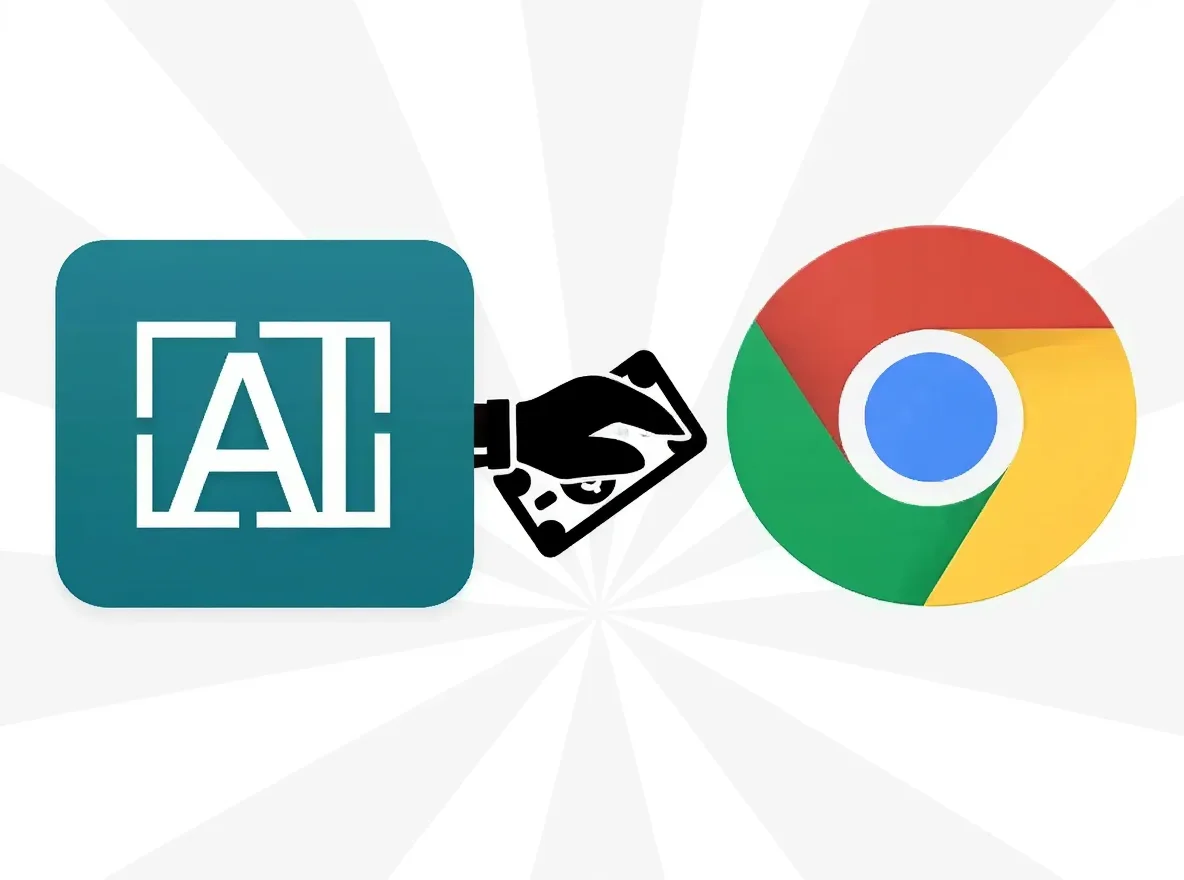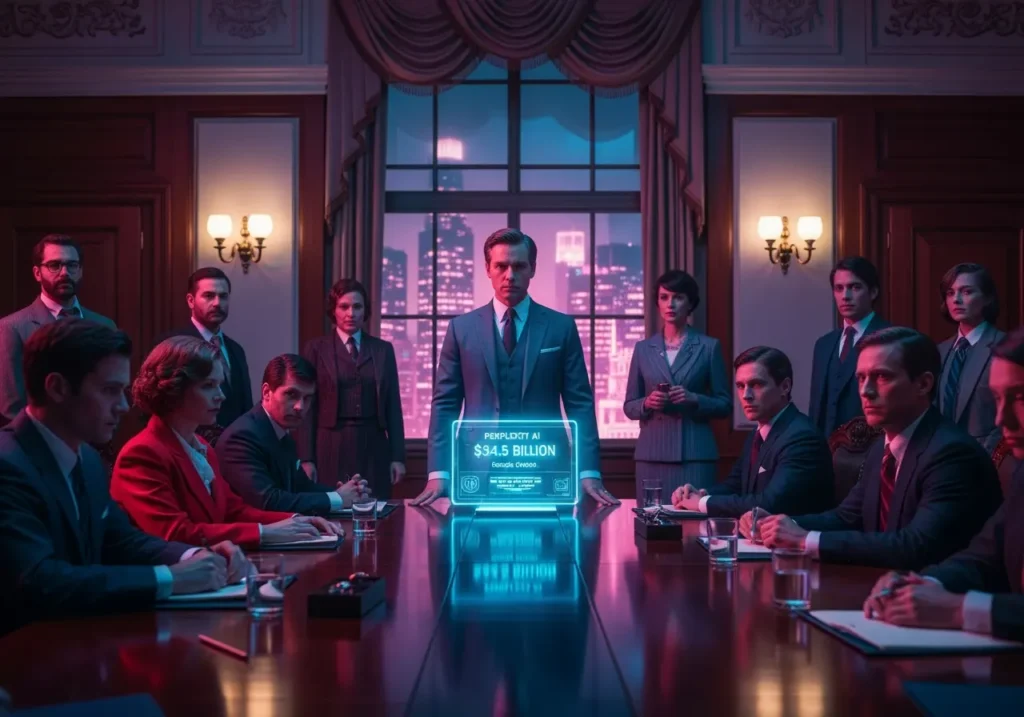Now Reading: Why Perplexity AI, Valued at $18 Billion, Made a $34.5 Billion Offer for Google Chrome
-
01
Why Perplexity AI, Valued at $18 Billion, Made a $34.5 Billion Offer for Google Chrome
Why Perplexity AI, Valued at $18 Billion, Made a $34.5 Billion Offer for Google Chrome

Perplexity AI, valued at $18B, shocked Silicon Valley with an unsolicited $34.5B all-cash bid for Google Chrome staking its claim amid antitrust turmoil. This article unpacks visionary CEO Aravind Srinivas’s rise, strategic impetus, investor backing, and what this audacious move signals for the future of AI and web browsing.
Imagine a David-sized startup standing against Goliath. That’s the picture Perplexity AI painted in August 2025 when its ambitious CEO, Aravind Srinivas, submitted an unsolicited $34.5 billion all-cash offer for Google’s Chrome browser even though his own company was valued at about $18 billion. It’s a bold, splashy move like showing up at a high-stakes poker table with only half the chips and doubling down. But beneath the drama lies real strategy: access to billions of users, a potential antitrust escape hatch for regulators, and a clear signal that the AI realm is no longer just for tech giants.
Who is Aravind Srinivas? The Perplexity AI CEO Behind the Headlines-Making $34.5B Google Chrome Bid
Aravind Srinivas’s Early Life and Education
If you picture a tech visionary, Aravind Srinivas might fit the mold and then some. The IIT Madras alumnus later pursued a PhD in Artificial Intelligence at UC Berkeley (sources vary), teaching himself Python, competing in Kaggle hackathons, and earning an internship with deep-learning luminary Yoshua Bengio. His path self-taught, resilient, endlessly curious feels more startup-origin story than textbook bio.
Aravind Srinivas’s Professional Journey
By 2022, Srinivas co-founded Perplexity AI in San Francisco with teammates Denis Yarats, Johnny Ho, and Andy Konwinski. Their vision: rethink search by combining large-language models with real-time web answers cutting through information clutter. By mid-2025, the startup had grown dramatically processing some 780 million queries per month, raising nearly $1 billion from investors like Jeff Bezos, SoftBank, Nvidia, and more, and earning a valuation between $14 billion and $18 billion.

Perplexity AI’s Ambitious Plans: The Chrome Bid and Launch of a New AI Browser
Let’s zoom out for a moment. Perplexity already has its own AI-powered browser, Comet designed to act like a digital concierge, helping you make decisions, shop, explore. But Comet is a whisper compared to the roar of Chrome’s 3+ billion users. By placing a bold offer for Chrome, Perplexity signals its intent: become a central player in the AI-search ecosystem today, not tomorrow. Think of it as bringing a flashlight into a dim room and flipping on all the lights at once.
Perplexity AI’s Bold $34.5B Chrome Bid Ignites Debate Amid Google’s Antitrust Struggles
Perplexity AI’s Vision: Looking Beyond the Bid
What’s the bet behind the bravado? It’s layered. First, Chrome controls the portal to how billions access the web news, ads, information. Acquiring it catapults a startup into a position of significant influence. Second, regulators are considering forcing Google to divest Chrome to restore competition making the offer both a strategic ploy and a potential antitrust remedy. Third, the offer framed as pro-user: preserve Chromium’s open-source nature, keep Google as Chrome’s default search engine, invest USD 3 billion over two years, and retain staff. It’s painted not as a takeover, but a guardianship offer for continuity and choice.

Breaking Down the Bid: Perplexity, Valued at $18 Billion in July, Claims Investor Commitments to Fund the Deal
Why the Offer?
- Regulatory alignment: DOJ and Judge Mehta might require divestiture; offering to buy positions Perplexity as a potential remedy rather than a disruptor.
- User reach: Chrome’s user base dwarfs nearly all existing AI browsers—granting Perplexity instant scale.
- Attention magnet: As one VC noted via Business Insider, “It makes them seem like a big player… helps them with fundraising, talent, and user attention.”
What Would Perplexity Gain?
- Access to over 3 billion users globally, unlocking advertising and data advantages.
- Credibility boost public consciousness, investor confidence, and talent interest.
- A seat at the table in AI browser wars, pitting against OpenAI, big tech, and emerging rivals.
Not Perplexity’s First Big Swing
Earlier in 2025, Srinivas proposed merging with TikTok US to address geopolitical concerns another high-profile, high-stakes maneuver. This isn’t a one-off grand gesture; it’s a strategic trajectory based on bold positioning.

Quick Fact Box
| Fact | Detail |
| Perplexity Valuation | $14B – $18B (July 2025) |
| Chrome User Base | Over 3 billion users |
| Offer | $34.5B all-cash, no equity, includes $3B investment pledge over 2 years |
| Open-source Commitment | Keep Chromium open source; retain Chrome staff; keep default search engine |
| Investor Backing | Unnamed funds pledged full financing |
| Regulatory Context | USDJ supports Chrome divestiture; Judge Mehta’s decision expected mid-Aug 2025 |
Action Steps
- Watch antitrust developments closely— Judge Mehta’s ruling could shift chessboard drastically.
- Study Perplexity’s investor network— understanding who’s backing them hints at their runway and leverage.
- Explore Comet— see how Perplexity’s own browser stacks up technically and UX-wise.
- Monitor competitor moves— OpenAI, Yahoo, Apollo have also eyed Chrome; watch for bidding groups or alliances.
- Revisit Web Ecosystem Strategy— if Chrome changes hands, the search and ad ecosystems might pivot in unexpected ways.
FAQ
Because access to Chrome’s 3 billion users would dramatically enhance its competitive position so paying a premium makes strategic sense if the aim is scale, not short-term stock value.
Google hasn’t signaled intent to sell; it plans to fight. An appeals process could stretch over years.
Perplexity says several large venture funds have committed to finance the deal in full but specifics are undisclosed.
Comet is their internal AI-native browser but Chrome still dwarfs it in users, so the bid is about reach and ecosystem impact.
Yes Perplexity faces lawsuits over copyright and scraping practices from outlets like the NYT, Dow Jones, and Cloudflare.
Closing Thought
I’d wrap this up like steaming coffee cooling on a café table—without “in conclusion,” but with warmth: There’s something thrilling about a young company leaning into the unknown offering billions, staking its claim, trusting in bold vision over comfort. Perplexity’s $34.5B chord is more than a bid it’s a calling card for a new era where AI startups aren’t just challengers. They’re potential kings.

Ethan Cole is an American journalist with expertise across weather, tech, travel, and culture. With over 15 years of experience, he delivers sharp, reader-friendly stories that simplify complex topics and connect with audiences worldwide.
Stay Informed With the Latest & Most Important News
Previous Post
Next Post
-
 01Happy Gilmore 2: Your Complete Guide to the Golf Comedy Sequel
01Happy Gilmore 2: Your Complete Guide to the Golf Comedy Sequel -
 02Joe Root’s Test Runs: England’s Batting Genius in Focus
02Joe Root’s Test Runs: England’s Batting Genius in Focus -
 03The Bad Guys 2 (2025): Everything We Know So Far
03The Bad Guys 2 (2025): Everything We Know So Far -
 04Demon Slayer: Kimetsu no Yaiba The Movie: Infinity Castle Tickets – Your Guide to the Epic Anime Event
04Demon Slayer: Kimetsu no Yaiba The Movie: Infinity Castle Tickets – Your Guide to the Epic Anime Event -
 05RTX 50 Series Unleashed: Next-Gen Gaming Power Awaits!
05RTX 50 Series Unleashed: Next-Gen Gaming Power Awaits! -
 06The Naked Gun 2025: What to Know About the Comeback Comedy Starring Liam Neeson
06The Naked Gun 2025: What to Know About the Comeback Comedy Starring Liam Neeson -
 07Sensory Clothing for Kids: What Every Parent Needs to Know
07Sensory Clothing for Kids: What Every Parent Needs to Know














